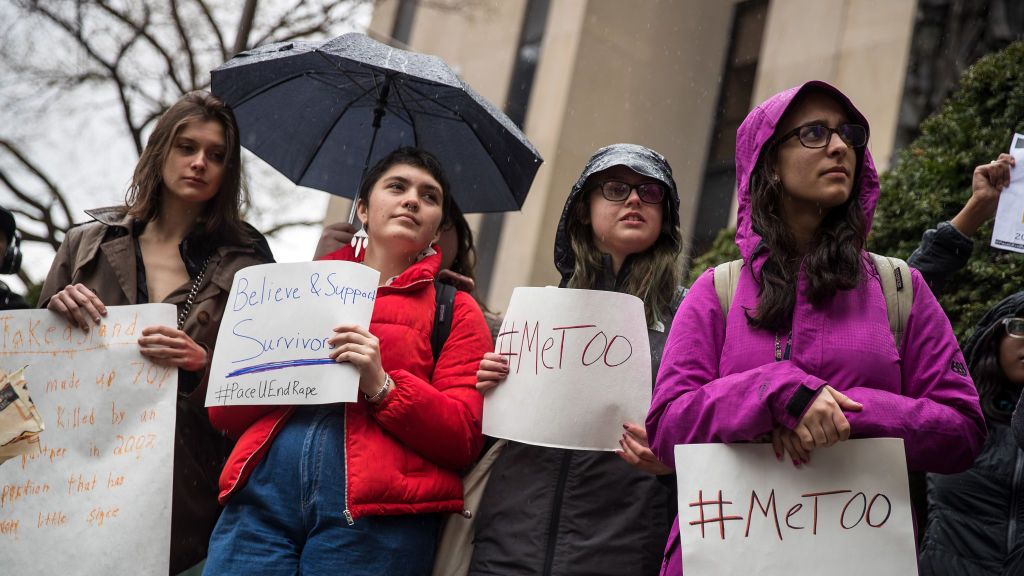What to Know About The Title IX Changes—And How You Can Fight Them
Betsy DeVos's proposed rule changes would drastically alter how schools handle sexual assault.

Last week, Secretary of the Department of Education Betsy DeVos announced rulings that would significantly limit Title IX, the 1972 civil rights act that made it unlawful to discriminate against students “on the basis of sex.” Typically, the law as it stands has made it easier for women to get equal education at the college level, but DeVos’s proposed changes target one aspect of the law in particular: They make it so that people accused of sexual harassment and misconduct on campus will have far more options than the people who accuse them, potentially putting power into the hands of rapists and taking it away from survivors.
Sexual assault among college students is already an epidemic. RAINN reports that nearly 12 percent of college students experience rape or sexual assault (taking into account that many survivors never report), and universities are often responsible for determining how reporting and due process play out. The proposed changes would make this problem far worse by, among other things, forcing accusers to confront the people they’re accusing, limiting the resources for reporting, and tying universities’ hands when it comes to seeking justice for survivors. That likely means that even fewer survivors will report, greatly exacerbating the already alarming statistic.
Fortunately, there is something you can do to stop these propose changes. The rules are now open to a comment period, which means the public can air their concerns and, if written in a correct and compelling manner, the department must respond or else face potential lawsuits. (If you want to skip the following explanations, scroll down to where it says “How can I make sure my comment is read?” to find out the best practices for filing.)
DeVos’s proposed changes are sweeping but convoluted, so to find out exactly what they mean for survivors of campus sexual assault—and how best to do something about them—Marie Claire spoke with Jess Davidson, executive director of the advocacy organization End Rape on Campus. Here’s everything you need to know:
What does Title IX have to do with sexual assault?
Even if you don’t know the specifics, you probably recognize the name Title IX from things like sports and admissions. It was a segment of the Education Amendments Act of 1972, which broadly outlined the ways learning institutions had to conduct themselves. Title IX is the most notable part, and it reads:
"No person in the United States shall, on the basis of sex, be excluded from participation in, be denied the benefits of, or be subjected to discrimination under any education program or activity receiving Federal financial assistance."
It’s often and famously used to guarantee that women have equal access to things like sports, on-campus housing, education, and even employment opportunities.
Get exclusive access to fashion and beauty trends, hot-off-the-press celebrity news, and more.
Davidson explains that Title IX started being applied to sexual assault in the 1980s. “If Title IX is in place to prevent people from experiencing lack of equal access to education, there was probably a case to be made that experiencing sexual violence was preventing equal access to education,” she says. “Courts have upheld that students have a right to not be assaulted and harassed in education and schools have a responsibility to respond when they’re aware of it, and they have to help student protect their Title IX rights.”

So what do these proposed changes do to Title IX?
Davidson points to three big changes that would seriously impact people wishing to seek recourse for sexual harassment. The first is a rule change that would make a university no longer responsible for students who are assaulted off-campus. “That is extraordinarily harmful. Nine out of every ten students live off-campus,” she says. “This rule would leave out all students who go to community colleges, who go to technical colleges, cosmetology school, students who live at home to save money, students who go to schools that don’t have the endowment to have a dorm—all of those students would be left out by that policy.”
The new rules would also change who a student could report their sexual assault to, and what that person’s ability to pursue action would look like. “Right now, if a student reports to their coach or to their student government advisor, then that person is responsible for going to the Title IX office and helping the university become aware of this incident and take action if that’s what the survivor would like.” This regulation would change the definition of who the survivor could report to, and if they didn’t report to the right person initially then the university would not be responsible for handling the incident.
This one makes very little sense: A survivor would likely talk to someone they believe would support them—a coach or trusted professor—and not the dean or an administrator they may have never met before. That means that many cases will go unreported. “We’re going to see fewer cases get to the Title IX office, through the Department of Education cutting students off at the knees there.”

And a third rule change would redefine sexual harassment that violates Title IX rights as “severe, pervasive, and objectively offensive” so that the survivor can prove that they had already lost access to education as a result of it. “It’s unconscionable,” says Davidson of the rule. “What we’re going to see is a lot of students trying to get assistance for sexual harassment and them being turned away.”
She also points to the impact this would have on students below the college level. “We are going to see a disproportionate impact on young brown and black girls, too, who experience disproportionate sexual harassment.”
One way this would manifest? According to the Washington Post, it would mean that the accused would not only get to look at all the evidence a school investigation has produced against them, but be able to cross-examine the person accusing them of harassment or assault, which could further traumatize survivors.
ICYMI: Betsy DeVos is hellbent on further traumatizing survivors of sexual abuse and blocking any chances at attaining justice. https://t.co/yy2yKIwNPSNovember 18, 2018
How is Secretary DeVos defending this?
DeVos has said that the existing system is unfair to the accused. But, says Davidson, “What the secretary is doing to these policies isn’t making the process fair; it’s preventing students from accessing the process whatsoever.”
Though Davidson says she doesn’t have insight into DeVos’s thought process, she identifies what she thinks is at least one clear motivation. “There’s a section in the regulation that talks about how this is going to save schools money, because it’s going to reduce the number of investigations—in the K-12 level by 51 percent and in college campuses by 39 percent,” she says. “So I think we’re seeing a motivation to prevent people from accessing help whatsoever, because it’s going to save schools money and time if they don’t have to investigate sexual assault and harassment when it’s happening.”
Can these rule changes be stopped?
Yes, but you’ll have to help. Under the Administrative Procedure Act (APA)—stay with me here—is a requirement for a period called Notice and Comment. When the comment period opens on regulations.gov, the public is invited to comment on the rule change by following specific comment guidelines. If those guidelines are met, then the government is legally required to consider what you’ve said. If they don’t listen to your comment, they are required to explain why.

“If it seems that they did not take these comments truly into consideration, that they just moved forward with what they wanted, [then] you can sue them and stop the rule in court,” says Davidson.
How can I make sure my comment is read?
The site HandsOffIX.org—a partnership between End Rape on Campus and the youth-led project Know Your IX—hopes to make the process as simple as possible. When the comment period opens, likely later this week, head to HandsOffIX.org to view data you can use in your comment, alternatives you can propose, and foreseeable problems with DeVos’ rule changes. If you write your own comment, the site will also provide the opportunity to have it vetted by a law student, who can make sure it will count under the APA. The site will also set up tools if you want to host your own comment-writing events around the country.
“We need hundreds of thousands of people to submit comments, because it can really show that the public is resoundingly opposed to this rule and the government moves forward with it anyway, we can stop this in court.”
Even if you think these rule changes don’t affect you, they might pave the way for something that does. If Title IX is gutted, it could be a harbinger for more Trump administration attacks on civil rights. There’s a way to stop these proposed changes, but we have to act now.
It’s not hyperbolic to say that the future depends on us doing something.
We’ll update as more information becomes available.
Cady has been a writer and editor in Brooklyn for about 10 years. While her earlier career focused primarily on culture and music, her stories—both those she edited and those she wrote—over the last few years have tended to focus on environmentalism, reproductive rights, and feminist issues. She primarily contributes as a freelancer journalist on these subjects while pursuing her degrees. She held staff positions working in both print and online media, at Rolling Stone and Newsweek, and continued this work as a senior editor, first at Glamour until 2018, and then at Marie Claire magazine. She received her Master's in Environmental Conservation Education at New York University in 2021, and is now working toward her JF and Environmental Law Certificate at Elisabeth Haub School of Law in White Plains.